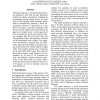Free Online Productivity Tools
i2Speak
i2Symbol
i2OCR
iTex2Img
iWeb2Print
iWeb2Shot
i2Type
iPdf2Split
iPdf2Merge
i2Bopomofo
i2Arabic
i2Style
i2Image
i2PDF
iLatex2Rtf
Sci2ools
130
Voted
ACL
2006
2006
Modeling Commonality among Related Classes in Relation Extraction
This paper proposes a novel hierarchical learning strategy to deal with the data sparseness problem in relation extraction by modeling the commonality among related classes. For each class in the hierarchy either manually predefined or automatically clustered, a linear discriminative function is determined in a topdown way using a perceptron algorithm with the lower-level weight vector derived from the upper-level weight vector. As the upper-level class normally has much more positive training examples than the lower-level class, the corresponding linear discriminative function can be determined more reliably. The upperlevel discriminative function then can effectively guide the discriminative function learning in the lower-level, which otherwise might suffer from limited training data. Evaluation on the ACE RDC 2003 corpus shows that the hierarchical strategy much improves the performance by 5.6 and 5.1 in F-measure on least- and medium- frequent relations respectively. It also shows...
ACL 2006 | ACL 2007 | Discriminative Function | Linear Discriminative Function | Upperlevel Discriminative Function |
Related Content
| Added | 30 Oct 2010 |
| Updated | 30 Oct 2010 |
| Type | Conference |
| Year | 2006 |
| Where | ACL |
| Authors | Guodong Zhou, Jian Su, Min Zhang |
Comments (0)

